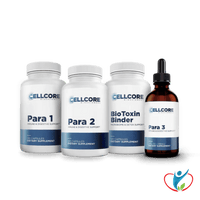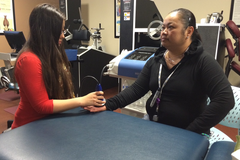Purpose
Vitamin K is a fat-soluble vitamin that works with Vitamin D and calcium.
It is important in:
- Coagulation
- Bone Growth
- Heart health
Recommended Daily Intake
It is difficult to become deficient in Vitamin K because our intestines naturally produce K1. However, those that have disorders that making it difficult to absorb nutrients are at a higher risk of deficiency.
| Female | Male | Pregnant | Breastfeeding | |
| Birth to 6 months | 2.0 mcg | 2.0 mcg | - | - |
| Infants 7-12 months | 2.5 mcg | 2.5 mcg | - | - |
| Children 1-3 years | 30 mcg | 30 mcg | - | - |
| Children 4-8 years | 55 mcg | 55 mcg | - | - |
| Children 9-13 years | 60 mcg | 60 mcg | - | - |
| Teens 14-18 years | 75 mcg | 75 mcg | 75 mcg | 75 mcg |
| Adults | 90 mcg | 120 mcg | 90 mcg | 90 mcg |
Signs and Symptoms of Deficiency
Vitamin K is especially important in coagulation of blood (changing from liquid to gel to stop bleeding after being cut). Therefore a deficiency results in the inability to coagulate blood.- Excessive bleeding
- Bruising easily
- Small blood clots underneath their nails
- Bleeding in mucous membranes that line areas inside the body
- Producing stool that looks dark black (almost like tar) and contains some blood
Food sources
There are both plant-based and animal-based sources of Vitamin K. Including a balance of the two types will allow you to get enough of both variants of Vitamin K; K1 and K2.
Sources that are rich in vitamin K are:
- Organic green leafy vegetables, such as spinach, swiss chard, mustard greens, kale, broccoli, and lettuce
- Organic natto (fermented soybean product)
- Grass-fed beef liver
- Pasture-raised poultry and pork
- Organic fruits, such as blueberries, figs, avocados
- Grass-fed meat and cheeses
- Pasture-raised eggs
Healthy Beings' Strategies to Address Deficiency
Healthy Beings offers supplements and services that can mitigate and address deficiencies you might be struggling with. We also offer recommendations beyond our current available inventory. You will find suggestions below that can help prevent a deficiency. If you are not sure if you have a deficiency, contact us HERE and we will answer questions you might have.
Maintain Optimal Vitamin K Levels!
Sources
1. https://ods.od.nih.gov/factsheets/VitaminK-Consumer/
2. https://www.healthline.com/health/vitamin-k-deficiency











